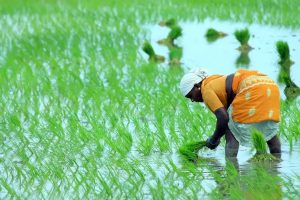Building a case for meso-level insurance: FPOs as Beneficiaries

Image by By Shyamalamuralinath on Shutterstock
In the last two blogs of this series, we articulated the point of view of sector experts and insurance providers about introducing meso-level insurance for agriculture in India. As we move forward towards building the case for meso-level insurance, in this blog we will discuss the perspectives of one of the potential beneficiaries of meso-insurance: Farmer Producer Organizations (FPOs). The insights presented here come from a series of interviews with board members of five FPOs located in Andhra Pradesh.
We interacted with FPOs that receive support, in the form of improved access to investments, technologies, knowledge support, inputs and markets, from the Government of Andhra Pradesh, that have been operational, on average, for about 3 years and that are made of ~2000 farmers each. These FPOs engage in groundnut, red gram cultivation, paddy and horticultural produce. The FPOs provide numerous services to their members, for a minimal contribution per year, in the form of promotion of agronomical practices, assistance with marketing and selling of produce, mobilisation of savings and provision of internal credit.
In order to understand the relevance of meso-level insurance, it was important to map out the risk profile of each of these FPOs to understand the most common and significant risks they face, the potential impact on agricultural activities for farmer members and the current risk mitigation measures in place. Production losses due to adverse weather conditions remain a high risk for most farmers in the region with several areas still dependent on rain-fed irrigation practices. The intermittent cycles of drought-like conditions and heavy rainfall leading to flooding has meant that the occurrence of such losses has been all too frequent. Not only does this lead to production losses but such losses also impact all other aspects of life in farming households. Production losses due to pest/ animal attacks, especially wild pigs, was also highlighted as a risk that the farmers from these regions faced during a particular period within the cropping cycle. Farmers often set up makeshift perimeters around their landholdings to mitigate this risk, however, these measures often prove to be ineffective. The losses can be particularly high for farmers with very small holdings as highlighted by one of the FPO leaders. These events that affect the farmers directly also have a negative impact on the health of the FPOs and disrupt its proper functioning as there may be cases of inability to pay their contributions for the FPO’s services and in other cases, an inability to pay back loans taken from the FPO.
Procurement of bad quality inputs (e.g. cases of spurious seeds, fertilizers, pesticides, farm equipment) was highlighted as a risk that could potentially have a high impact on agricultural outputs. However, with the active involvement of FPOs, the occurrence of such risk has been minimized according to our respondents. Though FPOs have been proactive in procurement of output directly from farmers, they have highlighted that they face high fluctuation in price levels when they are unable to find enough buyers or have to deal with middlemen. While the new farm bills introduced by the government earlier this year are aimed at alleviating some of these issues, they continue to be a major source of risk to the farmers in this region. Finally, the FPOs highlighted that production losses that occur during storage and transportation of produce after harvesting is a major concern for them.
The FPO leaders were aware of the concept of insurance with the Pradhan Mantri Fasal Bima Yojana (PMFBY) being the primary source of information on such products. However, there was no voluntary enrollment of the farmers under the scheme with a few farmers being enrolled by default through the Kisan Credit Card (KCC) channel. While the FPOs agreed that insurance would be beneficial for them if it can cover losses that the farmers face, they feel that most among them are unaware of the claims process. The experience of some farmers also suggests significant delays in receiving payments. Therefore, insuring the FPOs would be helpful to bring the farmers largely under the umbrella of insurance.
Several residual risks remain for smallholder farmers such as problems with storage and transportation of produce after harvesting and indebtedness due to previous borrowings for agricultural purposes. These residual risks provide a potential avenue for testing meso-level insurance products. Almost all states and union territories in India have registered producer organizations, reaching nearly 10,000 in number. The Government of India has also approved a dedicated central sector scheme — “Formation and Promotion of Farmer Producer Organizations (FPOs)” — for formation of 10,000 new FPOs in order to provide adequate handholding and professional support to develop economically sustainable FPOs while facilitating adequate market and credit linkages. This would provide a sizable scale for implementing a new meso-level product by leveraging the relationship with FPOs and their member farmers. This can overcome issues of low awareness, knowledge and trust of agricultural insurance among farmer groups. Distribution can also be easier and more cost-effective as awareness of the policy has only to reach the risk-aggregating intermediary (i.e. FPOs). FPOs can overcome distribution challenges especially among non-loanee farmers who are present with the current product. Consultative engagements with FPOs to understand localized and specific risks faced by its farmer members can be beneficial in developing customized insurance products relevant to the risks faced by the farming members, for instance, losses due to a lack of storage and transportation facilities, with the FPO acting as the policyholder on behalf of the interests of the farmer.
Our interactions with the FPOs demonstrated that there is widespread interest in taking up an insurance product if the compensation could be provided in a timely manner, especially if it helped to cover some of the unexpected residual risks: such as when there are losses in storage and transportation of the produce before selling it. This would also help them in instances where they wanted to diversify their crop production, introduce new and improved methods of cultivation, and promotion of best practices among member farmers.
The FPOs we interviewed are active in the Prakasam, Anantapuramu Districts in Andhra Pradesh. These FPOs are promoted by AP Society for Elimination of Rural Poverty (SERP) as part of their value chain development strategy.
This research was developed as part of the Bharat Inclusion Research Fellowship.
